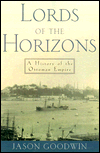
Rizwi S. Faizer Ph.D. McGill
rfaizer@yahoo.com
All content copyright
© 1998 Rizwi Faizer.


 Jason Goodwin.
Jason Goodwin.
Henry Holt and Company, New York: 1998.
ISBN: 0-8050-4081-1
I take this opportunity to present to you Fuad Ajami's review of
Lords of the Horizons but with some words of caution.
Goodwin does indeed attempt to expose the mystery that was the Ottoman empire,
both its brilliance and its brutal ugliness. This impact is largely achieved,
however, by cramming his readers to the brim with the most unbelievable detail.
I applaud him for his efforts.
Nevertheless, there are two unforgivable errors:
On page 6 Goodwin attempts an explanation of what differentiates the Sunni
[who constitute the majority of the Muslim community] from the Shi'a.
He says: "Shi'as believe that the descendants of Ali, the Prophet's son in law,
are the senior line; Sunnis that the grace descends through Fâtima,
his daughter."
The fact is, that while the Sunnis essentially approach Muhammad as
an extraordinary man whose authority and powers died with him, the Shi'a, see the Prophet
as endowed with very special powers, including infallibility, which are passed down to those
who succeed him in authority.
The second error appears on page 221. Here Goodwin informs us that
the descendants of the Prophet's sister were all known as emirs, and were
entitled to wear distinctive green turbans! The fact is the Prophet
was an only child. His father had died even before Muhammad's birth;
and his mother when he was six years of age. Such significant errors make it difficult
to accept the volume as a work of history: a pity, since it is nevertheless well put together,
and most entertaining.
And so, on to Ajami's review:
In its heyday, the Ottoman Empire reached from Iran to Turkey, encompassing a multitude of
ethnicities and more than three dozen nations. Islamic, though many of its subjects were not Muslim,
Turkish, though it was mostly Balkan Slavs who served as shock troops, the Ottoman Empire was
Byzantine in ceremony, Persian in dignity, Egyptian in wealth, and Arabic in letters. The long survival of
the empire, Jason Goodwin claims in Lords of the Horizons, his beautifully written account of the
period, was due to tolerance and flexibility and to practicing meritocracy instead of forcing cultural
assimilation.
Yet for all that tolerance, the Ottoman Empire was run by the army. Every road had a military
destination. The common language was that of the gert and bow. Horses were revered, sometimes
over men themselves. Peace divided men: They lost sight of a common goal, stirring trouble at home.
Where there was war, the Ottomans excelled; where there were the trappings of battle, the Ottomans
proved superior.
Power came from motion. With an army bivouacked for five months of the year, tents were a
significant part of life. At the last siege of Vienna, a canvas city was erected next to the capital that was
not only larger than Vienna itself, but better ordered. "Western camps were Babels of disorder,
drunkenness and debauchery. The Ottoman camp was a tea party disturbed by nothing louder than the
sound of a mallet on a tent peg."
Tea parties aside, battles fought to expand the Empire were anything but demure. Goodwin captures
15th-century battles with a contemporary zest. His descriptions of war evoke the balletic montages of a
film director like John Woo. "By mid-afternoon the stricken ships had collected a positive infestation of
Turkish vessels, clinging to their sides with grappling irons and hooks, aiming to carry them by assault
or fire.... Baltoghlu himself ran his ship into the prow of the big transport and around her the fighting
seemed fiercest, wave after wave of boarders steadily repulsed, the Byzantine weapon of Greek fire --
the equivalent of napalm -- used to deadly effect, the Turkish galleys forever entangling their oars, or
losing them to missiles dropped from overhead by the much higher Christian vessels."
The sword united the Ottoman empire; the pen divided it. Though the empire was one still based on
meritocracy, the agrarians began losing to a world which was becoming increasingly busy and bossy.
The martial strengths of the Empire became useless in the face of burgeoning industrialism in Western
Europe. A shamming took place, one impossible to fathom in a martial society. Although thousands
came to work in the palace every day, only about 20 people performed significant tasks.
Early in the book, Goodwin describes Sultan Suleyman in his twilight years as "a sort of metaphor of
empire, rotting and majestic, fat, made-up, and suffering from an ulcerous leg." The cancer was
nationalism. Inflation and a price revolution made for uncertain futures, causing nations to huddle
together for security. Tolerance was usurped by factionalism, petty rivalries, and disloyalty. Quarantine
systems were soon fixed around the Empire, making a mockery of the policy of acceptance which had
enabled it to flourish for so many years.
Lords of the Horisons offers a trove of delightful images as it provides a popular history. Only a
scholar with a somewhat odd yet poetic sensibility would conclude a study of the Ottoman Empire with
the detailed history of Turkish dogs: how they were accepted, cherished, and protected, how they
suffered, and why in the end they left, never to return.
Date: May, 2000.